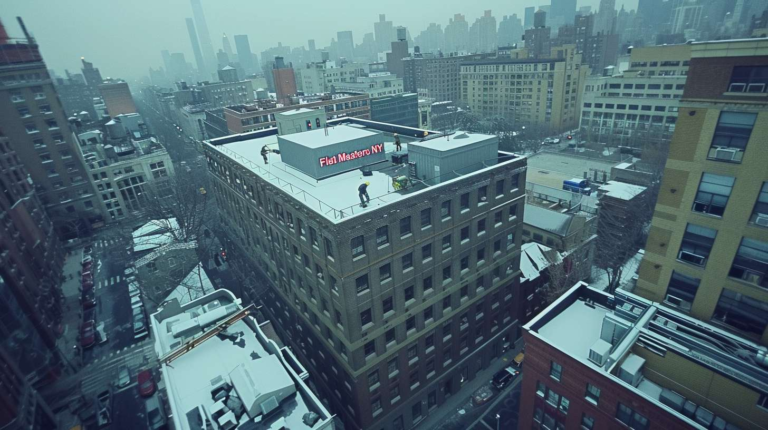Professional Vent Flashing Flat Roof Services Near You
Look, I've been installing and repairing vent flashing flat roof systems across Queens for over two decades, and let me tell you something - proper ventilation flashing is what separates a roof that lasts from one that becomes your worst nightmare. When water starts seeping around those vents, you're looking at damage that can run into the thousands if not caught early.
Why Vent Through Flat Roof Installation Matters
Every building needs to breathe, and on flat roofs in Queens, that means properly installed vents with bulletproof flashing systems. I can't tell you how many emergency calls we get at Flat Masters NY because someone tried to cut corners on the flashing around their roof vents. The membrane around that vent through flat roof penetration is your first line of defense against water intrusion.
Here's what most people don't understand about vents on flat roof systems - it's not just about the vent itself. The entire flashing assembly needs to work as one integrated system. We're talking about base flashings, counterflashings, and proper membrane detailing that has to handle thermal expansion, wind uplift, and New York's brutal weather cycles.
Common Vent Flashing Problems We See Daily
After installing over 3,000 flat roofs in Queens, I've seen every possible way vent flashing can fail. The most common issue? Contractors who don't understand proper membrane termination at the vent collar. They'll slap some roof cement around the base and call it a day. That's not flashing - that's a temporary band-aid that'll fail within two seasons.
Poor drainage around vents kills more flat roofs than anything else. When water pools around your vent penetrations because the flashing wasn't properly integrated with the roof's drainage system, you get accelerated membrane deterioration. I've seen twenty-year membranes fail in five years because of standing water issues around improperly flashed vents.
Professional Vent Flashing Installation Process
When we handle ventilation flashing flat roof to wall transitions at Flat Masters NY, we follow a systematic approach that's served us well for decades. First, we evaluate the existing roof structure and drainage patterns. You can't just punch a hole and hope for the best - every vent location needs to be strategically planned.
The actual installation starts with proper substrate preparation. We ensure the deck is solid, dry, and properly primed. Then comes the critical part - installing the vent housing with integrated flashing that's compatible with your specific membrane system. Whether you've got EPDM, TPO, or modified bitumen, the flashing details are completely different.
Here's where experience matters: the membrane-to-flashing connection. We use proper adhesives, mechanical fasteners where appropriate, and create watertight seals that can handle thermal movement. The top flashing gets sealed with compatible sealants, and everything gets tested before we consider the job complete.
Types of Flat Roof Vents We Work With
Not all vents are created equal, and the flashing requirements vary significantly based on the type of ventilation system you're dealing with.
- Exhaust vents - Kitchen and bathroom exhaust systems need flashing that can handle moisture and temperature fluctuations
- Plumbing vents - These require specialized boot flashings that maintain flexibility while providing long-term waterproofing
- HVAC penetrations - Larger openings that need custom flashing solutions and proper curb details
- Passive ventilation - Ridge vents and turbine vents that require different flashing approaches
Each type demands specific flashing materials and installation techniques. What works for a small plumbing vent won't work for a large HVAC penetration, and mixing up these details is where I see most failures occur.
Material Selection for Long-Term Performance
The materials we use for vent flashing flat roof installations have evolved significantly over my career. Back in the day, we relied heavily on lead and soldered joints. Today's synthetic materials offer better performance and longevity when properly installed.
For EPDM roofs, we typically use EPDM pipe boots and compatible flashing materials. TPO roofs get TPO flashings that can be heat-welded for superior bonds. Modified bitumen systems work best with self-adhering flashing membranes that integrate seamlessly with the roof system.
The key is compatibility. You can't mix materials from different chemical families and expect long-term performance. I've seen too many leak calls because someone used the wrong sealant or incompatible flashing material.
Queens-Specific Challenges
Working in Queens presents unique challenges that affect vent flashing installations. The salt air from the East River accelerates corrosion on metal components, so we always specify corrosion-resistant materials for flashings and fasteners. The temperature swings we get - from single digits in winter to the high 90s in summer - create massive thermal stress on flashing systems.
Snow loading is another factor. When three feet of snow sits on your flat roof for weeks, the weight can stress vent flashings beyond their design limits. We account for these loads in our installations and use mechanical fasteners rated for the conditions.
Maintenance and Inspection
Even perfectly installed vent flashing needs regular attention. I recommend twice-yearly inspections - once after winter and once before. Look for cracked sealants, loose flashing components, or any signs of water infiltration around the vent penetrations.
Small problems become expensive repairs if ignored. A tube of compatible sealant costs fifteen dollars. A full membrane replacement around a failed vent penetration can run into thousands.
Simple maintenance tasks like clearing debris from around vents and checking that flashing components are secure can extend the life of your installation significantly. Don't wait until you see water stains on interior ceilings - by then, the damage is already done.
Why Choose Flat Masters NY
We've been specializing in flat roof systems across Queens since 1998, and proper vent flashing installation is one of our core competencies. Our team understands the specific challenges of New York's climate and building codes, and we carry full licensing and insurance for your protection.
Every vent flashing job we complete comes with a comprehensive warranty covering both materials and workmanship. We use only manufacturer-approved materials and follow industry best practices for every installation.
If you're dealing with leaks around roof vents or planning new vent installations, give us a call at (917) 994-7618. We'll provide a detailed assessment and explain exactly what's needed to keep your building dry and protected. Don't let small vent flashing problems become major headaches - address them professionally from the start.


